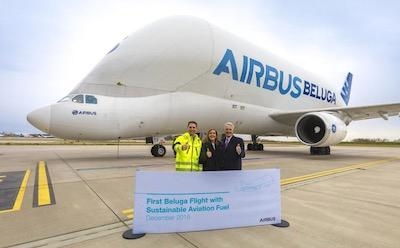How Recycled Waste Can Help Aircraft Reduce CO2 Emissions
A new generation of sustainable aviation fuel is being made from recycled materials like cooking oil or municipal waste. In comparison to fossil fuels, they can reduce CO2 emissions by 80%.

Technological innovation has changed many aspects of aviation in recent decades, significantly improving the sustainability of flight. Today, aircraft emit 80% fewer CO2 emissions per seat mile than they did 50 years ago. Despite the industry’s progress, however, one crucial element of aviation has remained relatively unchanged: fossil-based aircraft fuel.
Cleaner alternative propulsion technologies, such as electric and hybrid-electric, are under development but they are unlikely to be commercially available until the 2030s. With air traffic set to double in the next 20 years, more immediate solutions are required. Sustainable aviation fuel (SAF) can help.
Sustainable aviation fuels are made from non-biogenical sources such as municipal waste, used cooking oil or agricultural residues, without having a negative impact on land use or water supplies. Instead of being refined from petroleum like traditional jet fuel, SAF is made from sustainable, renewable feedstocks. First tested in 2008, SAF was initially made from biogenical sources such as sugarcane or corn.
Now, a second generation of sustainable fuels has addressed these issues. Newer SAFs are made from non-biogenical sources such as municipal waste, used cooking oil or agricultural residues, without having a negative impact on land use or water supplies. In comparison to fossil fuels, SAF can reduce lifecycle CO2 emissions by 80%.

Crucially, SAF is a ‘drop-in’ fuel. Because its chemical and physical characteristics are almost identical to those in conventional aviation fuel, the two can be safely mixed. Neither the supply infrastructure nor the aircraft themselves require any adaptation. That flexibility has already seen SAF used in more than 200,000 flights.
SAF is an important part of aviation’s path towards more sustainable flight. In combination with other initiatives, such as new materials and enhanced air traffic management, it can help the industry meet its decarbonization targets. These include:
Carbon-neutral growth: From 2020, net carbon emissions from aviation will be capped. This means that even though air travel is increasing, greenhouse gas emissions will not (as agreed by the Air Traffic Action Group).
50% reduction in CO2 emissions: By 2050, net aviation carbon emissions will be half of 2005 levels (as agreed by the Carbon Offsetting and Reduction Scheme for International Aviation).
Despite these benefits, adoption of SAF has been limited so far. This isn’t for lack of intent: airlines have committed to forward purchase agreements for around 1.5 billion gallons of SAF. But in 2018, SAF production was just 4 million gallons – less than 0.1% of the industry’s total fuel consumption. A major barrier is price, as SAF is two to three times the cost of fossil fuel. The industry believes that achieving 2% of global jet fuel from non-fossil sources by 2025 could create a tipping point for production and cost of SAF.
Airbus says it recognizes the importance of driving progress in SAF and it plays a key role in our long-term decarbonization strategy. Airbus was the first manufacturer to offer customers the option of delivering new aircraft with a blend of SAF. Multiple airlines have benefited from this program, developed in association with Air BP and Total. The company says it is also heavily involved in the ITAKA European initiative, which aims to speed up the commercialization of sustainable aviation fuel in Europe.
In December 2019, Airbus introduced SAF to select transportation flights from Hamburg with its Beluga ST freighter. The feedstock comes from recycled cooking oil and the fuel is made in nearby Finland to reduce transportation impact. It is expected to reduce CO2 emissions by about 120 metric tons during December – the equivalent of removing around 130 cars from the road, each driving 8,000 miles per year. From January 2020, the new, larger BelugaXL will also fly with SAF on select routes.
(Images provided with Airbus news release)
 ANN's Daily Aero-Term (04.25.24): Airport Rotating Beacon
ANN's Daily Aero-Term (04.25.24): Airport Rotating Beacon ANN's Daily Aero-Linx (04.25.24)
ANN's Daily Aero-Linx (04.25.24) Klyde Morris (04.22.24)
Klyde Morris (04.22.24) Airborne 04.24.24: INTEGRAL E, Elixir USA, M700 RVSM
Airborne 04.24.24: INTEGRAL E, Elixir USA, M700 RVSM Airborne 04.22.24: Rotor X Worsens, Airport Fees 4 FNB?, USMC Drone Pilot
Airborne 04.22.24: Rotor X Worsens, Airport Fees 4 FNB?, USMC Drone Pilot




